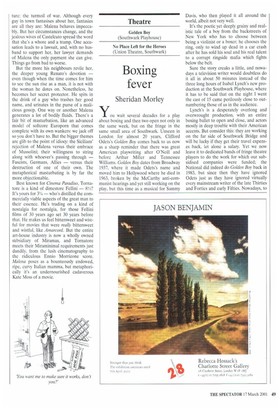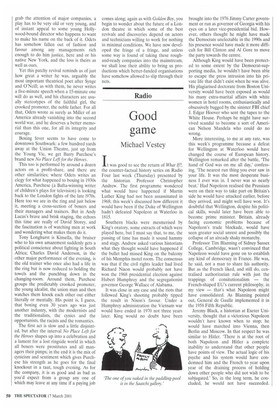Golden Boy (Southwark Playhouse) No Place Left for the Heroes (Union Theatre, Southwark)
Boxing fever
Sheridan Morley
You wait several decades for a play about boxing and then two open not only in the same week, but on the fringe in the same small area of Southwark. Unseen in London for almost 20 years, Clifford Odets's Golden Boy comes back to us now as a sharp reminder that there was great American playwriting after O'Neill and before Arthur Miller and Tennessee Williams. Golden Boy dates from Broadway 1937, where it made Odets's name and moved him to Hollywood where he died in 1963, broken by the McCarthy anti-communist hearings and yet still working on the play, but this time as a musical for Sammy
Davis, who then played it all around the world, albeit not very well.
It's the poetic yet deeply grainy and realistic tale of a boy from the backstreets of New York who has to choose between being a violinist or a boxer: he chooses the ring, only to wind up dead in a car crash after he has sold his soul and his real talent to a corrupt ringside mafia which fights below the belt.
Sure the story creaks a little, and nowadays a television writer would doubtless do it all in about 50 minutes instead of the three long hours of Isabel Lynch's new production at the Southwark Playhouse, where it has to be said that on the night I went the cast of 15 came perilously close to outnumbering those of us in the audience.
Lynch's is a desperately overlong and overwrought production, with an entire boxing ballet to open and close, and actors mostly in deep trouble with their American accents. But consider this: they are working on the far side of Southwark Bridge and will be lucky if they get their travel expenses back, let alone a salary. Yet we now leave it to dedicated bands of fringe theatre players to do the work for which our subsidised companies were funded; the National did indeed do Golden Boy back in 1983, but since then they have ignored Odets just as they have ignored virtually every mainstream writer of the late Thirties and Forties and early Fifties. Nowadays, to grab the attention of major companies, a play has to be very old or very young, and of instant appeal to some young Hollywood-bound director who happens to want to make his name on the back of it. Odets has somehow fallen out of fashion and favour among any managements rich enough to do him justice, here and or his native New York, and the loss is theirs as well as ours.
Yet this patchy revival reminds us of just how great a writer he was, arguably the most important theatrical poet after Synge and O'Neill; as with them, he never writes a five-minute speech when a 15-minute one will do as well, and his characters are usually stereotypes of the faithful girl, the crooked promoter, the noble father. For all that, Odets wrote as surely as Miller of an America already vanishing into the second world war, and he deserves a better memorial than this one, for all its integrity and courage.
Boxing fever seems to have come to downtown Southwark: a few hundred yards away at the Union Theatre, just up from the Young Vic, we get Barry Purchese's brand new No Place Left for the Heroes.
This too is performed by around a dozen actors on a profit-share, and there are other similarities; where Odets writes an elegy for what happened to boxing in 1930s America, Purchese (a Bafta-winning writer of children's plays for television) is looking back to the London fights of the late 1970s. Here too we are in the ring and just below it. meeting a cross-section of boxers and their managers and trainers. But in Andy Lucas's brave and brisk staging, the echoes this time are really of David Storey, and the fascination is of watching men at work and wondering what makes them do it.
Tony Longhurst is Kinsella, the bruiser who to his own amazement suddenly gets a political conscience about fighting in South Africa; Charles David Anderson, in the other major performance of the evening, is the old trainer who once also had a life in the ring but is now reduced to holding the towels and the punchbag down in the changing-room. Around them, Purchese groups the predictably crooked promoter, the young idealist, the union man and then watches them knock each other out either literally or mentally. His point is, I guess, that boxing even 30 years ago was just another industry, with the modernists and the traditionalists, the cynics and the opportunists, the racists and the romantics.
The first act is slow and a little disjointed, but after the interval No Place Left for the Heroes shapes up into a celebration and a lament for a lost ringside world in which all boxers were prostitutes and all managers their pimps; in the end it is the mix of cynicism and sentiment which gives Purchese his strength as he goes for the final knockout in a taut, tough evening. As for the company, it is as good and as bad as you'd expect from a group any one of which may leave at any time if a paying job comes along; again as with Golden Boy, you begin to wonder about the future of a London theatre in which some of the best revivals and discoveries depend on actors and technicians willing to work for nothing in minimal conditions. We have now developed the fringe of a fringe, and unless some way is found of taking these roughand-ready companies into the mainstream, we shall lose their ability to bring us productions which better-funded organisations have somehow allowed to slip through their nets.



































































 Previous page
Previous page